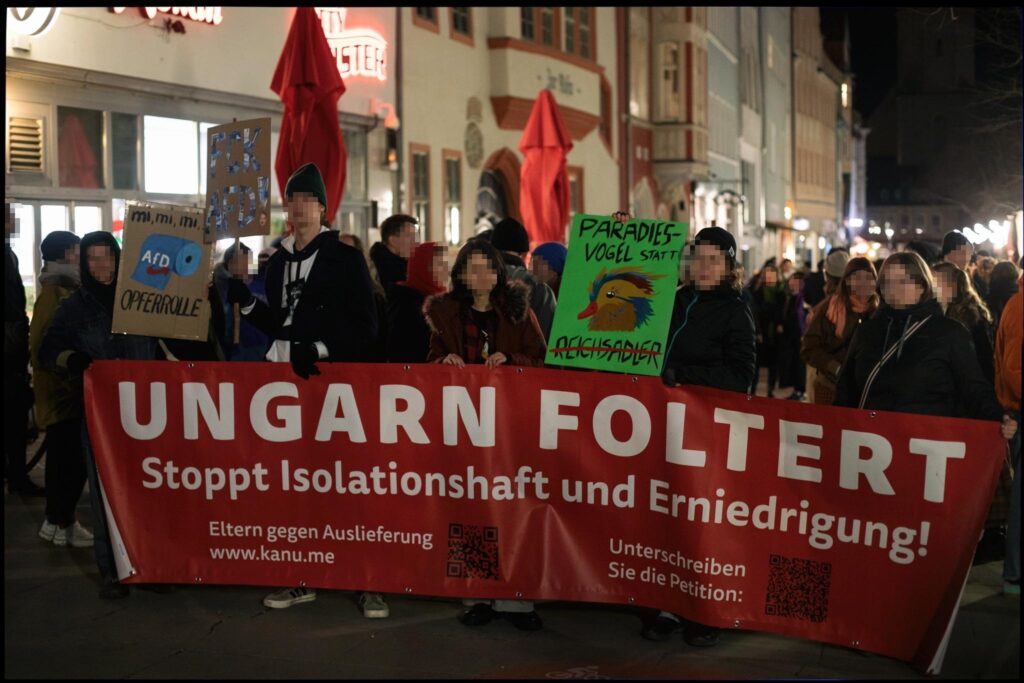
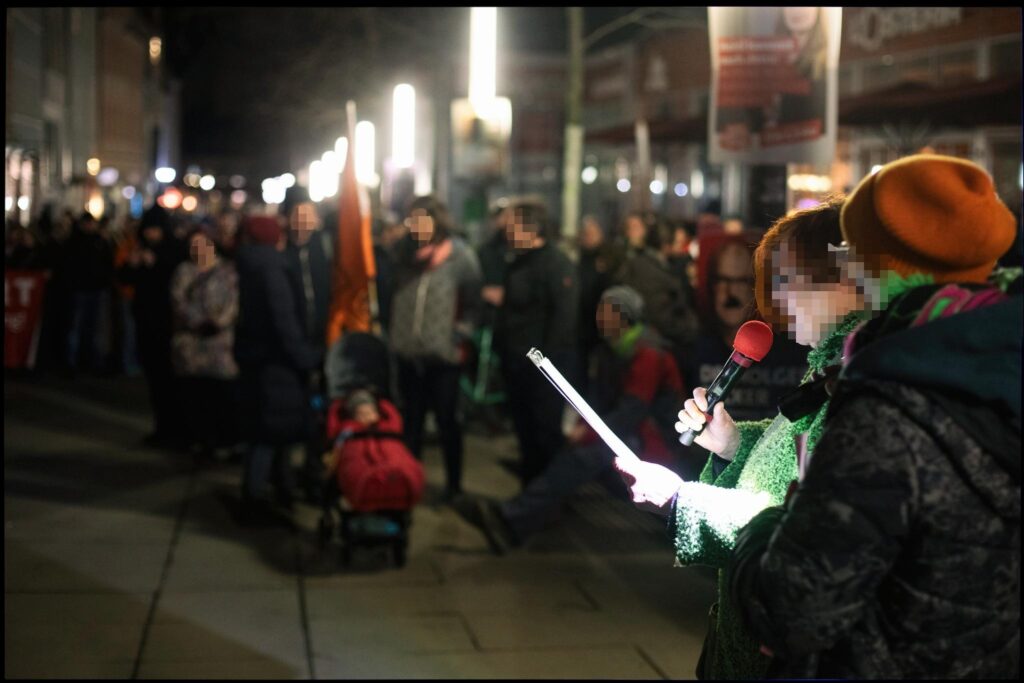
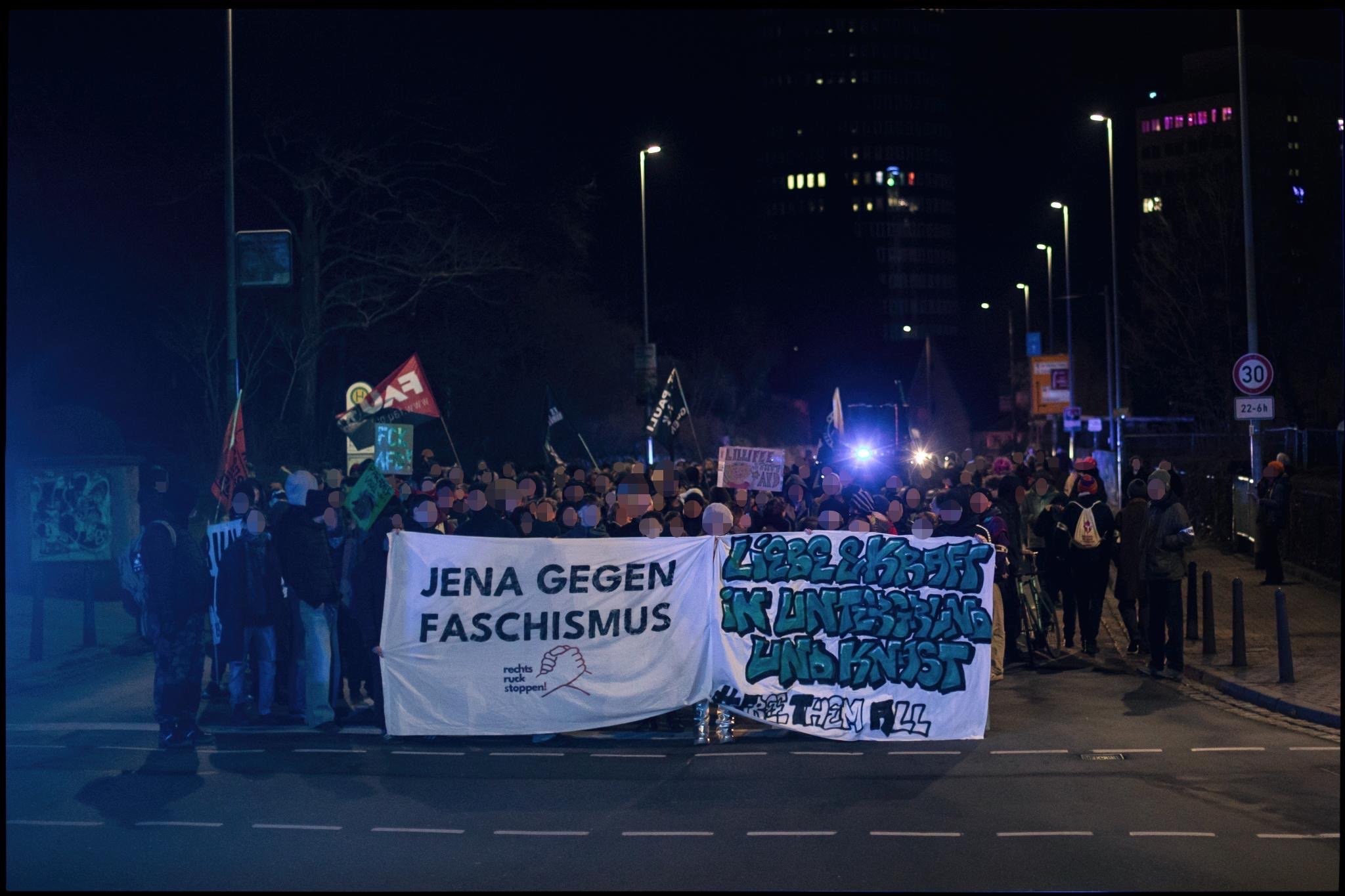



With your vote in the Bundestag election, you can prevent AfD seats in parliament. Understanding the parliamentary system and the latest electoral law reform is crucial to casting an informed vote. We explain what has changed.
How does our electoral system work?
The electoral law provides for personalized proportional representation. Personalized means that the first vote goes directly to the candidate from the constituency. The person who wins in this constituency enters the Bundestag as a direct candidate. This is called a direct mandate. Proportional representation means that the second vote determines the balance of power, i.e. the distribution of seats among the parties in the Bundestag. The seats in the Bundestag are initially allocated to the direct candidates who have won in the constituencies. All remaining seats, which are allocated to the parties according to the result of the second votes, are allocated to candidates who are on the parties’ state lists.
What is the basic mandate clause?
This means that a party enters the Bundestag if it has either received more than 5% of the second votes or if it receives at least 3 direct mandates via the first vote. Otherwise, it is not considered in the distribution of seats in the Bundestag.
What are overhang and compensatory mandates?
The electoral law reform has abolished overhang and compensatory mandates. If a party received more direct mandates than the number of seats it was entitled to in parliament based on the second vote result, the direct mandates were not eliminated, but were also included in the Bundestag. To ensure that a party does not have more seats in parliament than the other parties, the other parties receive compensatory seats to restore the balance of power. Overhanging and compensatory seats led to the parliament becoming ever larger.
Electoral law reform 2023
The electoral law reform is intended to limit the number of MPs to 630 so that parliament does not continue to grow. To this end, overhang and compensatory seats have been abolished and each party will only receive as many seats as it is entitled to according to the result of the second votes. The direct candidates with the best results in their constituencies will be the first to enter the Bundestag on behalf of a party.
Effects of the electoral law reform
Direct mandates no longer guarantee automatic entry into the Bundestag. The constituency winners with poorer election results are left empty-handed.
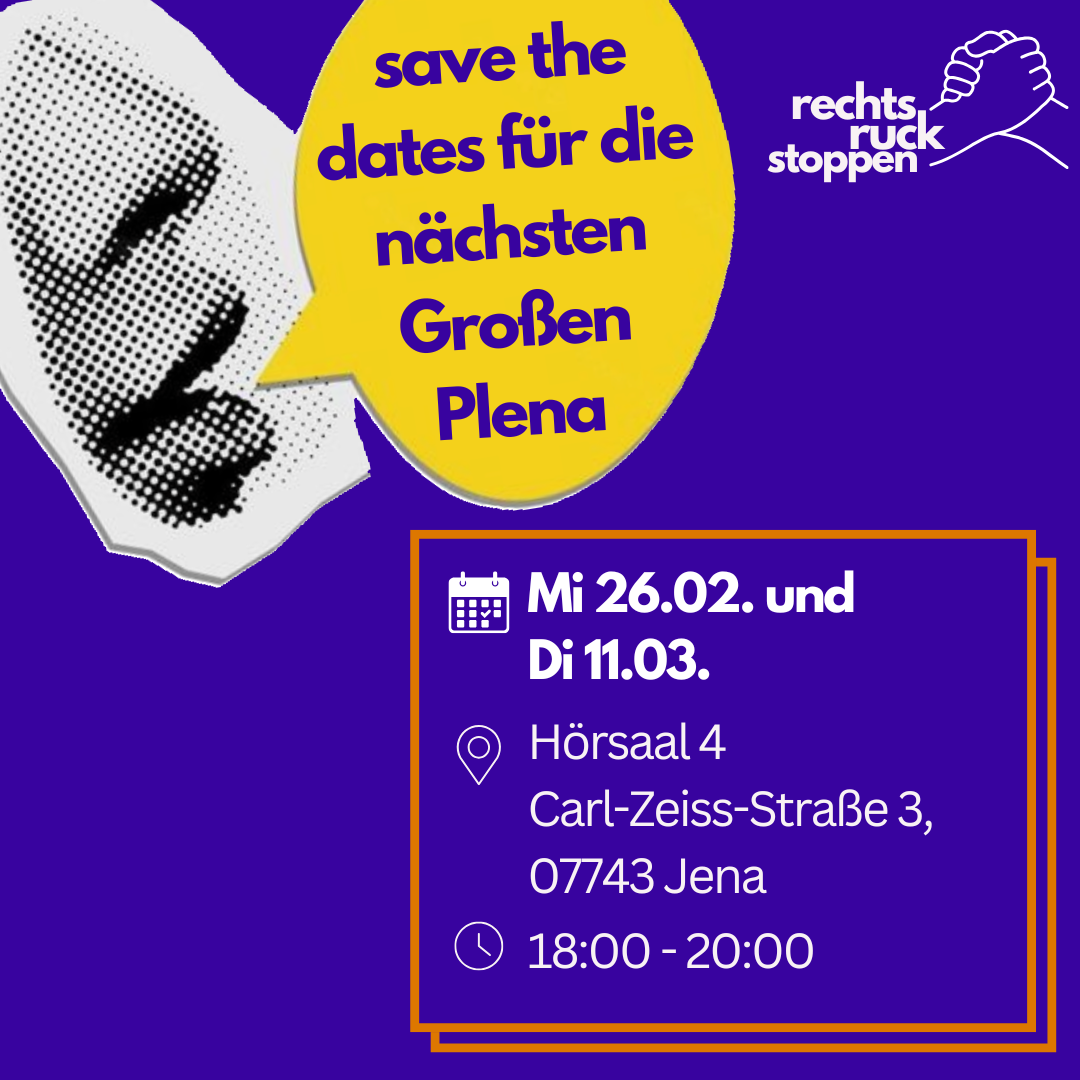
The dates of our next 2 large plenary sessions have been fixed for better planning:
Wed, 26.02. and Tue, 11.03.
The location is lecture hall 4 at Abbe Platz (Carl-Zeiss-Straße 3, 07743 #Jena)
You can also subscribe to all dates here: https://www.rechtsruckstoppen.de/events/
![Eine Gruppe von sieben Personen steht im Freien vor einem dreistöckigen weißen Gebäude mit grauen Akzenten. Einige Personen tragen Warnwesten und ihre Gesichter sind unkenntlich gemacht. Im Vordergrund ist ein Tisch aufgebaut, auf dem Speisen und Informationsmaterialien liegen. Ein Regenbogenbanner mit der Aufschrift "Kuchen für alle (für 0€ gegen...) [unklar]" ist an der Vorderseite des Tisches befestigt. Hinter dem Tisch stehen die Personen, einige von ihnen scheinen zu sprechen oder zu gestikulieren. Im Hintergrund sind geparkte Autos und ein klarer blauer Himmel sichtbar. Am linken Bildrand ist ein Verkehrsschild zu sehen.](https://www.rechtsruckstoppen.de/wp-content/uploads/2025/01/2025-01-21-20-30-14-702-768x1024.jpg)
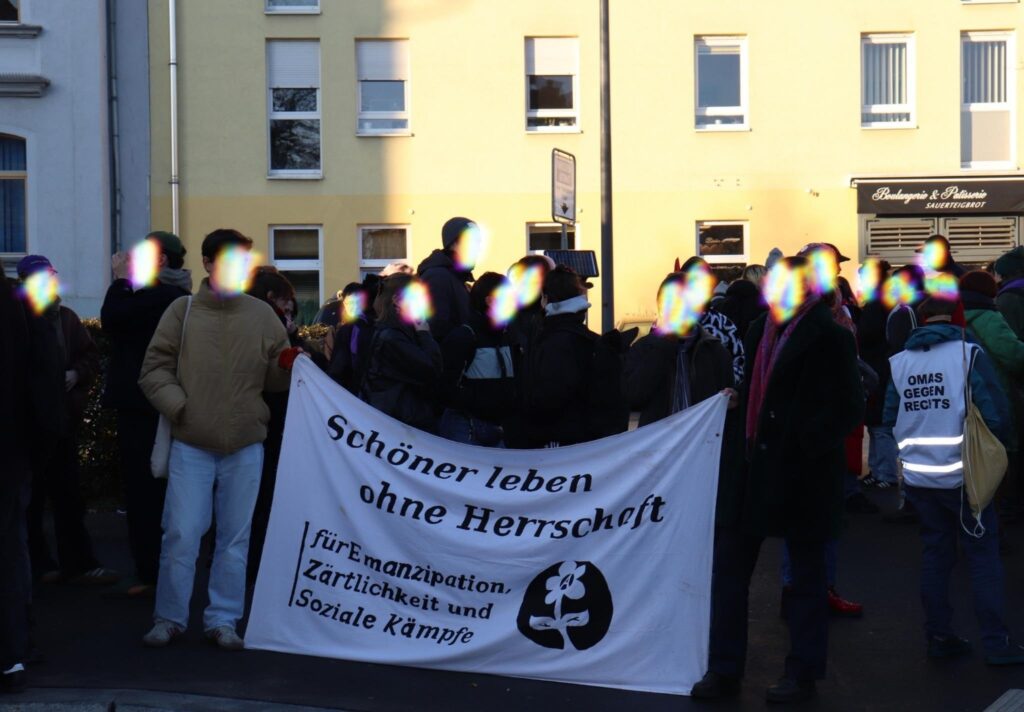
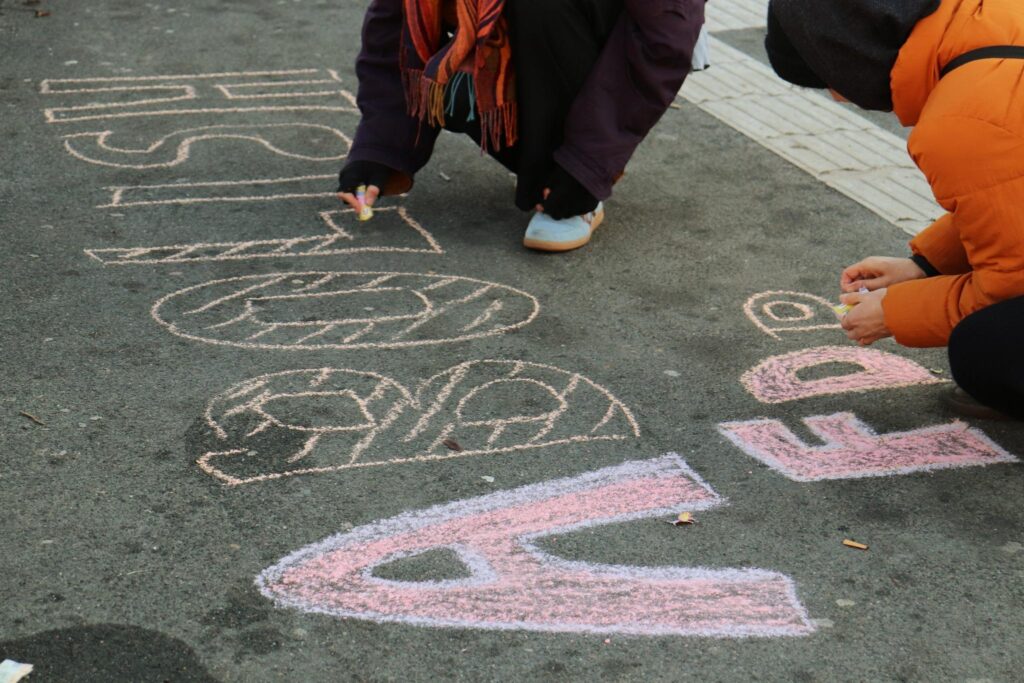

Only about 1 month to go until the federal elections. After we delayed the start of the #noafd party conference in Riesa by more than 2 hours with a loud protest on January 11th, we’re going straight on :). Here you can find an overview of anti-fascist events that we are currently aware of: https://www.rechtsruckstoppen.de/events. More information on the protest against the right-wing extremist JA in Apolda and Christian Lindner’s visit to Jena will follow soon. Come around and bring people with you! Alerta!
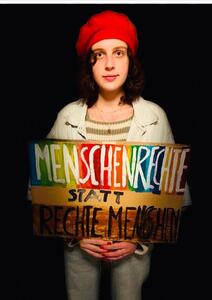
Sign the petition (https://weact.campact.de/petitions/bundeskongress-der-ja-verhindern-keine-gesichert-rechtsextremen-in-unserer-stadthalle-apolda) to deny the secured right-wing extremist association “Junge Alternative” the federal congress in our town hall. Mayor Olaf Müller (CDU) should apply §8(18) of the usage regulations to prevent hate speech and populism. Together for an open, tolerant Apolda!
At around 1pm, our Blue group reached the intersection with Friedrich-List-Straße via Lommatzscher Straße. Friedrich-List-Straße was blocked by the police, blocking our way towards the WT-Arena and the registered demonstrations. On the one hand, the police overtook us on the left and blocked the road towards the train station. On the other hand, we were directly attacked on the right by the police with shoves and punches to the face. They tried to force their way between us and the fence, which they failed to do as there were many demonstrators standing there. It was not clear why the police used such massive force here, and there were no requests from the police to us. The police units involved were from Saxony, Saxony-Anhalt and Schleswig-Holstein. The distraction was apparently used to block our way back via Lommatzesche Strasse with Hamburg bars.
The golden finger came via Friedrich-List-Straße from the direction of the train station and joined up with us, as the police were blocking this street with only a few forces. There were also members of the multi-coloured group. We were then surrounded from three sides, with occasional violence from the police. Further police reinforcements were called in from the direction of the station. Police officers from Thuringia were also involved in the following actions. In the minutes that followed, our side announced a demonstration march towards the station, as the police set up a massive threatening backdrop. At around 1:30 pm (the police said it was 1:20 pm), they issued the first warning and an expulsion order and threatened to use force to clear us out. The instruction was that the assembly should disperse in the direction of the station. The second warning from the police sounded no more than five minutes later with the time “13:32”. This was checked by us and was correct. A maximum of five minutes later, the third warning sounded. Some of us left the intersection in the direction of the train station. Immediately after the third warning, the eviction took place: the demonstrators were pushed together with massive police force from two sides of the intersection towards the street, so much so that some of us felt short of breath. Then we were roughly pushed and shoved against cars, fences, thorn bushes, lampposts and parked police cars towards the station. Many were kicked from the front and back with knees and boots against shins, calves, backs of knees and buttocks, even though we were moving on our own. Some fell, but those who followed continued to be pushed onto them. No consideration was shown for the injured either, cries and calls for paramedics were ignored and met with even more violence. Some police officers shouted and goaded each other.
We, a small two-digit number of people, were separated from the majority of the demonstrators by a closed police chain and pushed forward and against the fence between the police cars and the fence in a chain of one. Objections from us that we could go forward ourselves and not go any faster were answered several times with even stronger shoving and verbal humiliation and threats. In general, the situation was very chaotic and we were constantly shouted at. One policewoman (32/12, helmet symbol yellow on the left, green on the right) shouted: “You’ve got it too damn good!” while pushing a straggler. Demonstrators who did not resist were also grabbed by the back of the head and neck and pushed forward. An obviously limping person with two supports was physically and verbally harassed. Here, too, many of the police appeared to be out of their head, for example with their staring, wide-open eyes. They really enjoyed inflicting senseless violence on us. From about halfway along the route, the police violence subsided somewhat, and pepper spray was still used occasionally.
We perceived the whole situation as an extreme experience of violence. What was particularly bad for us was the impression that we were not perceived as human beings but were being herded towards the station like cattle. The massive violence even after the intersection had been cleared, when we were already trying to retreat to the station, was also shocking. The worst thing for some of us, however, was to see how much the police officers seemed to enjoy using violence. They apparently enjoyed it immensely and acted as if in a frenzy, behaving like empathiless violent offenders in uniform for whom physical assaults are no longer just a means to an end, but the end in itself. Given the extent and nature of the violence, it is clear that this brutality against demonstrators from democratic civil society is structurally anchored in the police force and is either ignored or even approved of and practised. We demand that politicians clearly distance themselves from such police violence and hold those responsible to account. As we were also victims of Thuringian police officers, we expect a public apology from the Thuringian Minister of the Interior Georg Maier, the will to clarify the situation and the willingness to prohibit such (presumably planned) police violence in advance in the future. For those of us who have experienced all this, our trust in the police has been destroyed. If they don’t want to establish themselves as a state organ of repression in the service of the AfD, they should change the way they behave and deal with democratic protesters and the police representatives responsible should apologize publicly.
An additional perspective can be found here: https://www.tagesschau.de/inland/regional/sachsen/mdr-auf-heimweg-aus-riesa-panik-verzweiflung-menschen-schieben-um-attacken-der-polizei-zu-entgehen-100.html
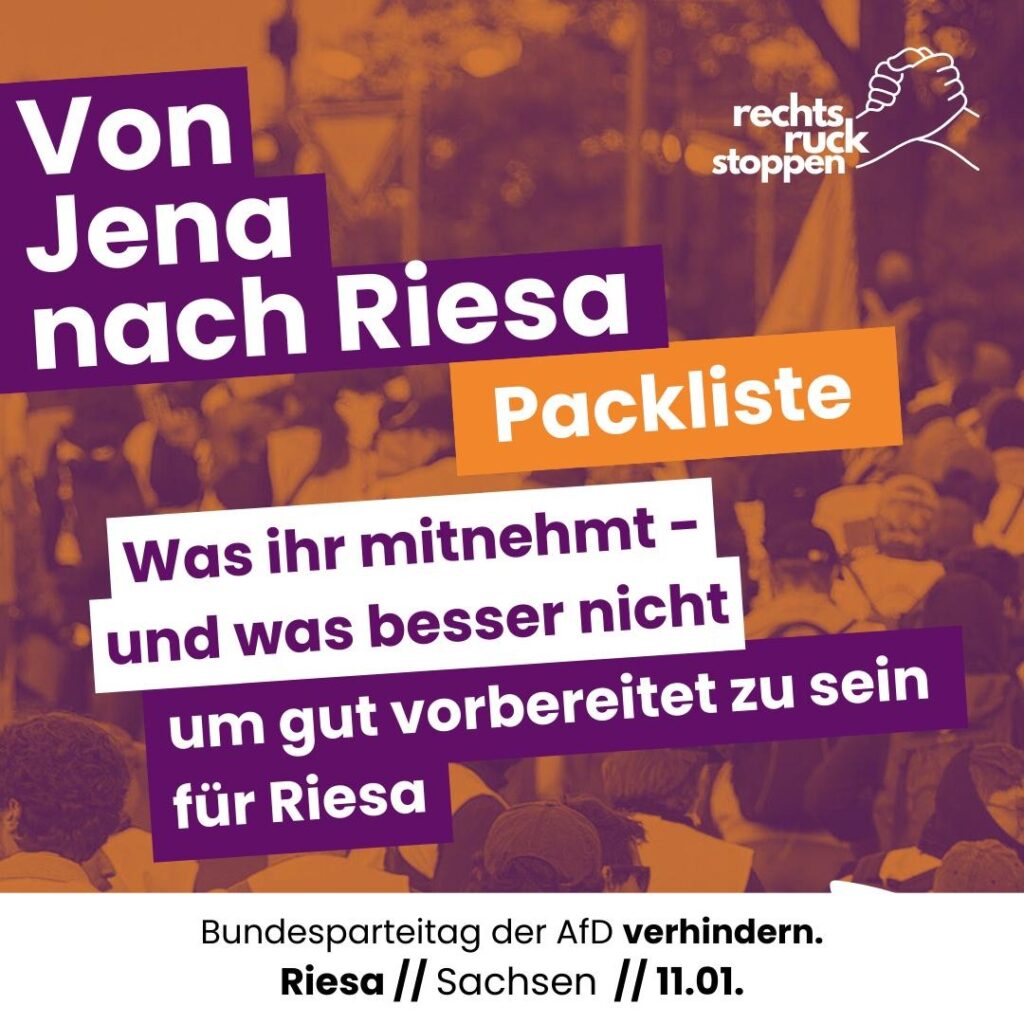


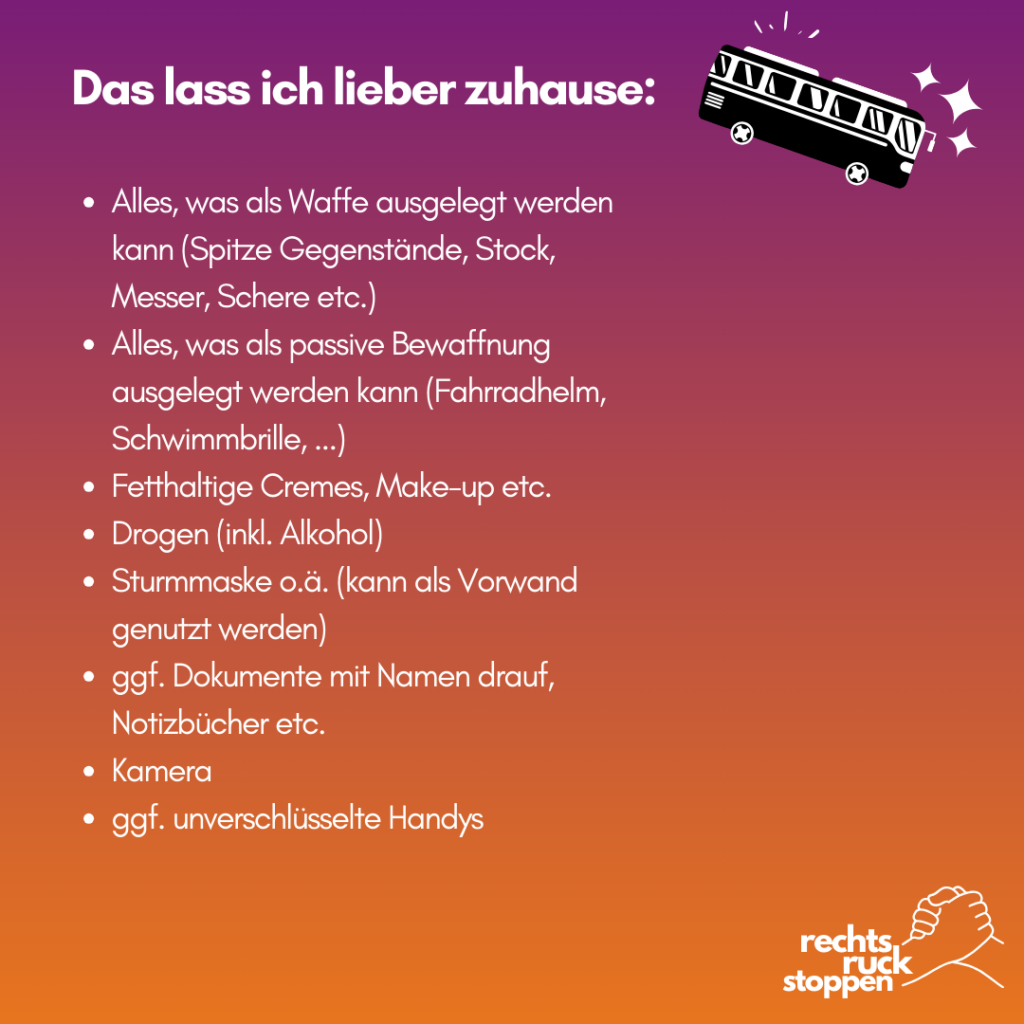
Our Christmas party was a wonderful end to an eventful year. Away from our political activities, we took time to celebrate together, exchange ideas and simply let the year come to an end. We diligently screen-printed Stop Right-Wing Pressure logos, competed in a fun pub quiz and enjoyed the community that makes us so strong. 🖤✊ 20
25 is just around the corner, and we look back with pride and gratitude on a year in which we achieved an incredible amount:🌍 We networked – not just in Jena, but throughout Thuringia.✊ We organized and carried out a variety of campaigns against the shift to the right.❤️ We worked together for a society based on solidarity in which “elbow against elbow” does not rule.
Thank you to everyone who joined us at events, actively participated or supported us in other ways. 🙌 2024 has also taken its toll – which makes these moments of coming together and recharging our batteries all the more important. We are taking a short break until the beginning of January before we start the anti-fascist year 2025 with full energy. 💥
Until then, have a good rest, stay in solidarity and let’s keep fighting together for a just world. ❤️
Translated with DeepL.com (free version)
Kommst du mit am 11.1. von #Jena nach Riesa? Wäre schön! Doch wie? Hinlaufen? Zu weit! Radfahren? Zu kalt! Bahnfahren? Zu oft umsteigen… wir empfehlen einen Bus. Wie und wo Du an Tickets kommst, das zeigen wir Dir jetzt.